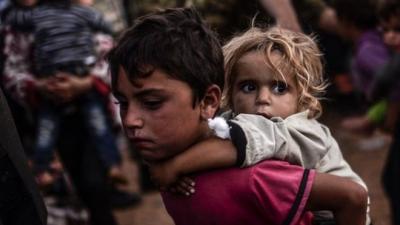Migrant crisis: Italian families to open their doors

ROME -- In the wake of the three-year anniversary marked this week of the Lampedusa boat tragedy in which 366 migrants died in the Mediterranean, Italian families are being encouraged to welcome young victims of war and poverty in a 'family to family' approach, headed by Marco Griffini and the Amici dei Bambini organisation.
In a failed attempt to reach the Italian shore by boat last week end, nine perished and 6,000 others were rescued from the Strait of Sicily, the Coast Guard reported Monday. As horrifying as these stories are, presently they seem all the more frequent, as thousands, desperate to escape the horrors of their own country, do not arrive at their destination alive.
Shockingly, the UNHCR (United Nations High Commissioner for Refugees) records that this year more than 50 million have been left homeless due to war and famine, forced to flee their homes in order to merely survive. This number has not been so high since the Second World War. Clearly, the crisis has not settled but intensified, just as a stable solution has still not been reached.
Hence, Marco Griffini, president of the non-governmental organisation Amici dei Bambini (Friends of Children), believes Italy -- and indeed Europe as a whole -- must act immediately. It is not enough to simply sympathise with the plight of refugees. Instead, the European community must welcome with open arms the most vulnerable victims of conflict and poverty -- children.
The UNHCR records that from Jan. 1, 2016 up to the present, fifteen percent of all migrants arriving in Italy were young children who travelled alone.
Addressing the Foreign Press Association in Rome, Monday, Griffini highlighted the importance of a ‘family to family approach’ to the immigration dilemma. The scheme asks Italian families to temporarily house migrant children in their own homes, providing them with much needed shelter, food and warmth.
According to the president of the charity, 2,300 Italian families have already offered the possibility of housing a foreign minor. Griffini considers this act as “not one of kindness, but as a political response to the current crisis we face.” Seemingly, this is a duty we must undertake as human beings, not solely a good deed that we deserve praise for. As the motto of Amici dei Bambini states, ‘every child has the right to be a child.’
Supporting the work of Bambini in Alto Mare (Children in High Seas), a branch of Amici dei Bambini which offers humanitarian aid in both Syria and Italy, SPRAR (Central Service for the Protection System of Refugees) has various initiatives in place to promote the growth of such children into responsible adolescents with goals for the future, who can contribute positively to society.
Thus, as 50 Syrian families become homeless every hour, Griffini claims “the big question is why? Why can’t we open our doors? Why can’t we help?” The message is very much an urgent one. At present, 13, 500 Syrian refugees are in need of humanitarian aid. Of this number, 6,000 are children -- young victims who never asked for war, never asked for their homes to be destroyed, and who had no choice when they were shipped to a foreign country.
For more information regarding the work of Amici dei Bambini, visit www.aibi.it
sw



